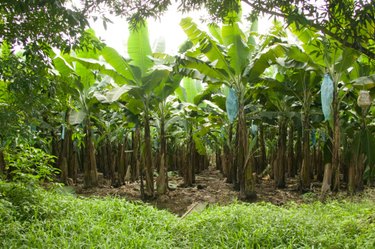
Commercial plantations are a subset of commercial farming, where one particular crop is grown on a large scale and sold. Such plantations grow rubber, oil palm, coconut, banana, tea and tobacco, among other crops. The main characteristics of commercial plantations are large land size, hot climate, fertile soil, cheap labor, the widespread use of pesticide, and the use of genetically modified seed in order to consistently produce high yield.
Exploitation of Labor
Video of the Day
Laborers that work on commercial plantations are often severely exploited, given low wages and exposed to inhumane working and living conditions. Due to the severity of the work and constant exposure to the sun and poisonous substances like pesticide, workers in these plantations have very short life spans, high risks for cancer (mainly skin cancer) and high infant mortality rates. Plantation workers are often illiterate, as plantation owners generally do not install educational programs for the benefit of the workers or their children. This illiteracy benefits the plantation owner, as it makes it more difficult for workers to find work elsewhere.
Video of the Day
Environmental Issues
Commercial plantations have a severely negative effect on the environment. Plantations are large enterprises and require a lot of fertile land. Hence, in plantation countries like Indonesia, Malaysia and some parts of India, plantation farming has become one of the main causes of deforestation. Deforestation destroys the local ecosystem as animals lose their habitat and is the cause of widespread flooding and landslides, which, on a macro level, increase global warming.
Pesticides
Commercial plantations are aggressive business ventures. To ensure that their harvest is not affected by insects, they use pesticides like dichlorodiphenyltrichloroethane, or DDT. DDT is known to cause harm to the ecosystem as other animals ingest it and are poisoned. For example, DDT use on Californian farms nearly caused the extinction of the Californian condor. Pesticides are poisonous not only to animals, but also to humans as they get absorbed in the crop. This factor has given rise to the debate between organic crops (pesticide-free) and crops that were grown with the aid of pesticide.
Solution
Governments encourage commercial plantations because of the principle of economy of scale: a lot of the same crop can be produced cheaply. But governments should regulate these enterprises by enacting and enforcing laws requiring plantation owners to educate the labor force and pay them decent wages, regulating deforestation and protecting forests, and banning pesticides. The neglect of social and environmental responsibilities by the plantation owner and government are the main disadvantages associated with commercial plantations.